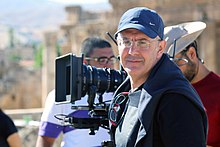This article has multiple issues. Please help improve it or discuss these issues on the talk page. (Learn how and when to remove these messages)
|
Philippe Aractingi (فيليب عرقتنجي) is a Lebanese author, director, producer, actor and photographer.[1] Aractingi is Franco–Lebanese. He has directed more than 70 documentaries and 4 feature films. Two of his films, Bosta and Under the Bombs, were the only Lebanese entries in the 2006 and 2009 Oscar ceremonies,[2] respectively.

Aractingi is the co-founder of the Lebanese Cinema Foundation (FLC) and the vice-chairman of the Beirut Screen Institute Committee.
Early life
editPhilippe Aractingi was born in Beirut, Lebanon. At the age of 8, his father gave him his first camera. From the age of 16, he captured photographs of the war. Aractingi decided to teach himself film documentary making. At the age of 20, he filmed his first broadcast documentary in his hometown, Beirut.
Philippe moved to Paris in 1989 at the age of 25. In 1989, Aractingi founded his own production company, Fantascope. His 1991 documentary Vol Libre au Liban won the Best Short Film Award at the Saint-Hilary Film Festival. Par le Regard des Mères won the gold medal of the Jeux de la Francophonie. In 1995, he also released Le Rêve de l’Enfant Acrobate, which won the Grand Jury Prize at the Beirut Film Festival.
In 2005, after returning to Lebanon, Philippe Aractingi produced and directed his first feature film, Bosta, a post-war Lebanese musical. The film has 140,000 box office admissions and received eight awards, including Best Screenplay at the Carthage Film Festival (JCC), the 2006 Golden Murex, and the Best First Work Award at the Arab Film Festival in Rotterdam.
In 2006, when another war broke out in Lebanon, Philippe Aractingi filmed his second movie, Under the Bombs. The film narrates the tale of a woman's quest to locate her sister and son amidst the war. Released in 2008, Under the Bombs was selected in over 40 festivals, including BAFTA and the Sundance Film Festival. It won 23 awards worldwide. Under the Bombs and Bosta were both selected to represent Lebanon at the Oscars in 2006 and 2009, respectively.
In 2017, Aractingi released Listen. Since it is PG 18 in Lebanon, the authorities prohibited its distribution in the rest of the Arab world. The film won 8 international prizes, including the Best Sound, Best Picture and Best Director awards at the Lebanese Movie Awards, and represented Lebanon at the Golden Globes in 2017. In 2018, Aractingi was appointed Chevalier de l’Ordre des Arts et des Lettres by the French Ministry of Culture.[3]
In 2019, he released Thawra Soul, a short movie documenting the Lebanese Revolution. In 2023–24, he directed a documentary for Gedeon Programmes entitled Liban, Les secrets du royaume de Byblos.
Exhibitions
editIn 2010, he developed a series for an exhibition in Paris, "Nuit sur Beyrouth", displaying shots of Beirut by night. His second exhibit, "Obsessions", took place in Beirut in 2018 and depicted the city's evolution over time. The exhibition was accompanied by an installation called "Beirut Through Time", a setup of three screens showing the city of Beirut from three different perspectives.[4] In 2022, Philippe took part in a collective exhibition, "Hunna".[5]
Filmography
edit- Bosta (2005)
- Under the Bombs (2008)
- Heritages (Documentary) (2013)
- Listen (2018)
Others (documentaries)
edit- Le Rêve de l’Enfant Acrobate, 1995 (Morocco)
- Beyrouth de Pierre et de Mémoire, 1992 (Essai)
- Vol Libre au Liban, short film, 1993
- Through Mother's Eyes, 1992
- Thawra Soul, 2019
- Portrait of Ghassan Tuéni (Une terre pour un homme), 2012
- Liban, Les secrets du royaume de Byblos, documentary, for ARTE, 2024
Writings
edit- Métier de femme, métier de mère: Book co-written with Lela Chikhani-Nacouz
- Nabil le petit étranger (screenplay): Prize Maroun Baghdadi of the Best Script at the International Beirut Festival, 1998 ; Lauréat de la Bourse Beaumarchais, 1995
- Scriptwriting contribution by "la commission de l’avance sur recette du CNC", 1996
References
edit- ^ "Director's Biography: Philippe Aractingi". www.fantascopeprod.com. Retrieved 13 January 2020.
- ^ "Philippe Aractingi - Biography". IMDb. Retrieved 2024-02-21.
- ^ "One Fine Art | artists - actors / Philippe Aractingi". www.onefineart.com. Retrieved 2024-02-21.
- ^ Khalaf, Colette (September 19, 2018). "Philippe Aractingi and the unbearable fragility of Beirut". L'Orient-Le Jour.
- ^ Oubari, Sheimaa (2022-03-08). ""Hunna" ou Elles, une célébration du féminin". Ici Beyrouth (in French). Retrieved 2024-08-14.